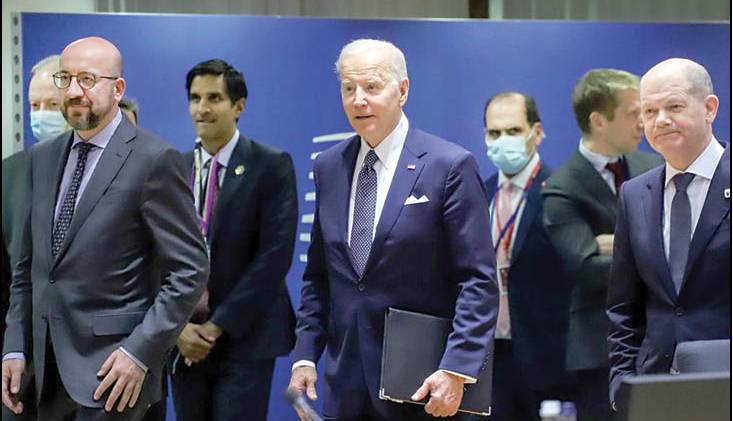With the passage of nearly seven months, the war page was turned over. At the beginning of September, the Ukrainian army, with the help of its Western allies and a flood of arms aid from its NATO supporters, achieved significant territorial gains in the east and in the south. Along with the liberation of Kherson, Kiev’s recent long-range attacks on Russia constitute another part of Ukraine’s recent achievements. However, what is evident is the inability of the warring parties to achieve complete victory. In this regard, although Russia has become tougher against the pressure of domestic and international public opinion, it sees lack of supplies as a big problem on its way. Ukraine also needs more weaponry aid from the West to continue the effective movement of its military engine. On the other hand, despite a year of sympathy among the NATO allies of Kiev, there is a difference on the approach of the Western capitals in relation to supporting Ukraine. By examining those differences in this note, the question will arise that is NATO, which was thought to have regained its identity with the start of the Ukraine war, once again caught in the divergent differences of its members?
Transatlantic gap, differences
There are several points of disagreement on the issue of Ukraine war among NATO allies. At first, it seemed that once again the important and urgent issue of the “West facing Russia” would overcome all differences, but Biden’s comments in the White House regarding his limitations in supporting Ukraine due to the opposition of some European allies with the continuation of the all-out war with Russia, it showed the problem to be more challenging than what was imagined.
On the NATO support front, the issue of weapons and financial aid, the risks and crises caused by the continuation of the war, the perception of Eastern and Western Europe on the issue of confrontation with Russia are the issues that constitute the main differences.
As the war began, the United States and its NATO allies unanimously put support for Ukraine on the agenda. In the United States, Republican senators loudly asked Biden to provide American weapons to Kiev as soon as possible, but many Republican senators are currently criticizing Biden’s financial aid and weapons to Ukraine. The reason is related to various issues. A large part of the body of the Republican Party, especially the “US First” movement, believes that Europe is once again taking a free ride from the United States. Currently, the United States bears the bulk of the burden of financial aid and arms to Ukraine. By October 2022, Washington had provided 8.5 billion dollars to Ukraine. This is while the value of aid sent by the European Union to Ukraine in the same period does not exceed 3.6 billion dollars. In addition to the issue of “burden sharing” which is considered by the Americans, the defense of the Europeans can also be examined. Europeans believe that in addition to financial aid in the form of the European Union, individual aid from EU member states is also sent to Ukraine. However, it seems that this number does not add much to the total sum of the European aid to Ukraine, because only Germany has been able to raise its individual aid amount to one billion dollars. Other evidences of Europeans are more worthy of consideration. Europe believes that despite initial pleasant cooperation and coordination, the embargo on Russian natural gas and its shortage in Europe has caused the United States to sell its liquefied natural gas to the bloc at a very high price.
Different security perceptions in US, Europe
In addition to the economic issues and the distribution of the costs of the war in Ukraine for NATO allies, security issues are also important, to such an extent that with the reduction of European support, the campaign in Ukraine for the United States may turn into an arms race with Russia. Such a trend may weaken the United States in the face of China’s challenge; a topic that will not be welcomed in the United States.
In Europe, there is a much more sophisticated view of security. The powerful European countries in NATO consider the increased level of tension and conflict with Russia to be in contrast with the security doctrine of the European Union. According to France and Germany, Russia can be a part of the European security strategy. This is where the NATO crisis on the one hand, and the conflict of opinions in Western and Eastern Europe on the other hand, appear.
Contrary to the United States, Western Europe, especially Paris and Berlin, do not welcome the increase in the level of conflicts due to the risk of its spread to other parts of Europe, as well as the possibility of creating an atomic war or another comprehensive war on the green continent. As such, the French president’s visit to the United States was also aimed at pressuring Biden to reduce the level of conflicts on the Ukrainian front. In addition to the differences between Europe and the United States, Europe is currently struggling within itself with many differences of opinion regarding the conflict with Russia in the Ukraine war. Despite the West, which considers Russia to be part of Europe’s security, Eastern countries, often neighboring Russia, see this country as a major threat to Europe and believe that if Russia conquers Ukraine, stability and security in Europe will face a severe crisis.










0 Comments